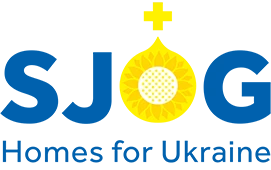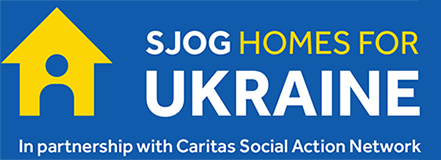I have applied to sponsor a person displaced by the war in Ukraine. What happens next?
If you are selected as a potential match for a displaced Ukrainian, you should be aware that the matching process can take relatively long time. Since matches are based on the Ukrainian guests’ needs and preferences, it really depends on your location and what you can offer in terms of accommodation. For example, if you’re in London, you’ll likely be matched quite quickly but if you’re in a rural area it could take longer.
Our team will assess the expression of interest in line with our standard guest assessment procedures. After this, we will approach potential hosts and share the guests’ information for consideration. Once a host has agreed to host and act as sponsor, we would introduce host and guest. From this point, the host must liaise with the guest to make the visa application. The host will need to request the relevant information for the visa application. Once the visa application(s) have been submitted, hosts should keep in touch with their guest so that they know when the visa is granted.
When the guest(s) arrive in the UK, the placement will be supported according to our normal standards. We will check in regularly with both host and guest and be there to provide support and address concerns as they arise.
You can read more about being a sponsor, including responsibilities, checks, and how you can support your guests: https://www.gov.uk/guidance/homes-for-ukraine-sponsor-guidance
Can SJOG help with the visa application?
We cannot help with visa applications. This is the link to the visa application on the UK government website and it explains how the visa process works: https://www.gov.uk/guidance/apply-for-a-visa- under-the-ukraine-sponsorship-scheme
You may need to apply for visa on behalf of your guest(s).
There are also organisations offering this help, including ‘Here for Good’ which has guides to filling in the application: https://www.hereforgoodlaw.org/ukraine
What level of support will I need to provide my guest?
The government’s visa support scheme requests that the sponsor provides:
- A minimum of 6 months of hosting without charging rent.
- Assist the Ukrainian guest to arrive safely to your home.
- Your own passport details so that DBS and/or Enhanced DBS checks can be carried out against your name.
- You may wish to help your guest(s) with settling into life in the UK, their paperwork and integration (BRP, GP, bank account, education and employment) however this is not expected from you.
What will my guest be entitled to?
The visa will allow the individual to stay in the UK for 3 years. They will be able to live, work and study in the UK and access public funds. They will also be able to access further support from the Local Authority.
What happens at the end of the six-month sponsorship period?
Sponsors are committed to hosting guests for a minimum of 6 months, but you may choose to continue beyond the initial six months if you and your guest wish to.
If you don’t want to continue the arrangement beyond 6 months (or at any time after that), you should let your guest know in plenty of time so they can make other arrangements.
Sponsors should aim to give notice two months before the end of the 6 months (or with 2 months’ notice before any later date).
Guests will have access to public funds and, after leaving your home, will be able to rent a property like anyone else. If they need to, they’ll be able to claim the housing part of Universal Credit or Housing Benefit.
Am I entitled to receive the £350/month?
Yes, hosts in this specific set up will be able to access the £350/month from their Local Authority. Currently, this lasts for up to one year. There are no stipulations as to how you can use this money.
For sponsors who receive welfare payments, the government is ensuring thank you payments do not affect your benefit entitlement. Thank you payments will not affect any council tax discounts for single occupancy.
Can guests change their sponsor before or once they arrive? If someone’s sponsor changes their mind once they’ve arrived, can someone else take them in?
We are still waiting for guidance from the UK government on how a ‘rematch’ can happen. Nevertheless, if your initial sponsorship breaks down or your guest moves on early, you should contact your local council in the first instance. If appropriate, your council may decide to offer a rematch with a new guest.
More information can be found here: Homes for Ukraine: guidance for councils - GOV.UK (www.gov.uk)
If my match did not work, can I be matched with a new guest?
In SJOG Homes for Ukraine programme, we try our best to ensure that you are matched with the most appropriate profile based on your application form. We are also working on preventing relationship breakdown. Nevertheless, if your initial sponsorship breaks down or your guest moves on early, we recommend to contact our managers and notify your local council. If the breakdown is due to any illegal or harmful activity, you should inform the police. The local authority would be required to confirm the rematch and you will be entitled to receive monthly ‘thank you’ payment - £350.
We can offer a rematch with a new guest applying from Ukraine or EU or those guests who are already staying in the UK under Homes for Ukraine scheme.
Can I offer a home to Ukrainian displaced individuals already staying in the UK?
Ukrainian families staying in the UK can apply for a rematching before 6 months period of placement is completed and after 6 months period is completed.
Most of Ukrainian displaced individuals who arrived to the UK under Homes for Ukraine scheme, attend English language classes, can find jobs easily and could afford rending a rooms or apartments and ready to live independently after or within 6 months period of placement. However, sometimes within or after initial matching Ukrainian families might look for a new host to live with. In most cases, displaced people who are in need of domestic rematch in the UK, have their paperwork done and can navigate the system, so integration process will go smoothly for them and might me better option for you. If you wish to host Ukrainian family staying in the UK, kindly mention this in your registration form, and remember that property and DBS checks still need to be completed by local authority.
What does the Government have in place to safeguard the Ukrainians and those sponsoring? If something goes wrong, can SJOG help?
The government is responsible for security checks on Ukrainians coming to the UK and also for DBS checks for prospective sponsors - https://www.gov.uk/guidance/homes-for-ukraine-scheme-frequently-asked-questions.
In our programme, we carry out reference checking to make sure sponsors is able to host vulnerable people
In order to ensure a successful arrangement, we also carry out an additional reference check from a community member outside of your household to make sure you are able to host vulnerable individuals.
We will continue to create and post resources on our website that may be of help to you, including training sessions and any other relevant updates.
If you suspect that your guest is being exploited, you can report this to the Modern Slavery and Exploitation Helpline Modern Slavery Helpline
If you have a safeguarding concern regarding your guest, or you are concerned about their behaviour, you should contact your local authority immediately. If it is an emergency, contact 999.
What if my guest doesn’t speak much English?
Guests have different levels of English, but we will always let you know what level of fluency your guests have. Some of our hosts and guests are able to communicate in another common language, whereas others find Google Translate a helpful tool. Some of our guests may have difficulty communicating for various reasons and so visual aids and body language can be very helpful. Most of guests and hosts are able to communicate well. Exposure to and opportunity to practise English can be extremely beneficial for some guests. There are multiple resources to learn English for your guests both offline and online.
What should I expect when hosting a Ukrainian guest?
Your decision to help those fleeing the war in Ukraine is admirable. Yet, this is not a minor undertaking, so it is important to consider what this can mean for you and the people you live with.
Some Ukrainian guests are coming directly to hosting from a traumatic and precarious situation with no time to recover after such long journeys to Poland and to the UK. As the war is on-going, it is likely that guests will continue to process trauma while they are being hosted. They may lose family members or friends during the 6-month period. All of which will impact on mental health and how the guest interacts with the host family.
Your Ukrainian guests will need to find work and accommodation independently, and this might be difficult for some, especially if balancing the care of their children. Local Authorities and Job Centres will help with ESOL classes and finding work.
Things to be aware of in your home:
- Be mindful about watching and discussing the news about the war when your guest is present
- Signs of trauma or the need for mental health support (please see our support material)
- Need for rest and personal space, privacy and boundaries
- Cultural differences in lifestyle and home living (see events page to know more about them during our information session and in our toolkit for sponsors)
- Be mindful of how you refer to and introduce your guests to others. You guests may not wish to be referred to as “refugees” or may perceive it as disrespectful of their dignity.
We invite you to also check out the page where we have collected useful links for you. Useful Links

